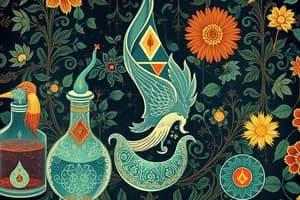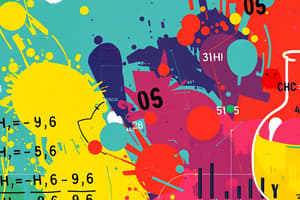Podcast
Questions and Answers
What is the definition of an element?
What is the definition of an element?
An element is a pure substance that cannot be broken down into simpler substances by chemical means.
What is the definition of a compound?
What is the definition of a compound?
A compound is a substance made up of two or more different elements chemically bonded together in a fixed ratio.
How many elements are in the compound NH3?
How many elements are in the compound NH3?
2
How many elements are in the compound NaNO3?
How many elements are in the compound NaNO3?
How many elements are in the compound O2?
How many elements are in the compound O2?
How many elements are in the compound CH3COOH?
How many elements are in the compound CH3COOH?
How many elements are in the compound CCl4
How many elements are in the compound CCl4
A solid has the shape ______, the volume _____, and compressibility ______.
A solid has the shape ______, the volume _____, and compressibility ______.
A liquid has the shape ______, the volume _____, and compressibility ______.
A liquid has the shape ______, the volume _____, and compressibility ______.
A gas has the shape ______, the volume _____, and compressibility ______.
A gas has the shape ______, the volume _____, and compressibility ______.
What word describes the phase change - solid to liquid
What word describes the phase change - solid to liquid
What word describes the phase change - solid to gas
What word describes the phase change - solid to gas
What word describes the phase change - liquid to solid
What word describes the phase change - liquid to solid
What word describes the phase change - liquid to gas
What word describes the phase change - liquid to gas
What word describes the phase change - gas to liquid
What word describes the phase change - gas to liquid
What word describes the phase change - gas to solid
What word describes the phase change - gas to solid
Oxygen
Oxygen
Hydrogen
Hydrogen
Air
Air
Kool-Aid dissolved in water
Kool-Aid dissolved in water
Trail Mix
Trail Mix
Oil and Vinegar Salad Dressing
Oil and Vinegar Salad Dressing
What is the law of conservation of mass?
What is the law of conservation of mass?
How are heterogeneous and homogeneous mixtures different? Please include 1 example of a heterogeneous and 1 example of a homogeneous mixture.
How are heterogeneous and homogeneous mixtures different? Please include 1 example of a heterogeneous and 1 example of a homogeneous mixture.
Compare and contrast elements and compounds.
Compare and contrast elements and compounds.
What 2 states of matter does a Supercritical Fluid exist in?
What 2 states of matter does a Supercritical Fluid exist in?
What are supercritical fluids used for?
What are supercritical fluids used for?
What piece of equipment is this?
What piece of equipment is this?
What piece of equipment is this?
What piece of equipment is this?
What type of equipment is this?
What type of equipment is this?
What type of equipment is this?
What type of equipment is this?
Which of the following best describes what happens when you pass the critical point on a phase diagram?
Which of the following best describes what happens when you pass the critical point on a phase diagram?
What state of matter is Letter A in?
What state of matter is Letter A in?
What state of matter is Letter B in?
What state of matter is Letter B in?
What state of matter is Letter C in?
What state of matter is Letter C in?
At what point is letter E at?
At what point is letter E at?
Flashcards
Element
Element
A pure substance that cannot be broken down into simpler substances by chemical means.
Compound
Compound
A substance made up of two or more different elements chemically bonded together in a fixed ratio.
NH3 elements
NH3 elements
2 elements (Nitrogen and Hydrogen)
NaNO3 elements
NaNO3 elements
Signup and view all the flashcards
O2 elements
O2 elements
Signup and view all the flashcards
CH3COOH elements
CH3COOH elements
Signup and view all the flashcards
CCl4 elements
CCl4 elements
Signup and view all the flashcards
Solid shape
Solid shape
Signup and view all the flashcards
Solid volume
Solid volume
Signup and view all the flashcards
Solid compressibility
Solid compressibility
Signup and view all the flashcards
Liquid shape
Liquid shape
Signup and view all the flashcards
Liquid volume
Liquid volume
Signup and view all the flashcards
Liquid compressibility
Liquid compressibility
Signup and view all the flashcards
Gas shape
Gas shape
Signup and view all the flashcards
Gas volume
Gas volume
Signup and view all the flashcards
Gas compressibility
Gas compressibility
Signup and view all the flashcards
Solid to liquid
Solid to liquid
Signup and view all the flashcards
Solid to gas
Solid to gas
Signup and view all the flashcards
Liquid to solid
Liquid to solid
Signup and view all the flashcards
Liquid to gas
Liquid to gas
Signup and view all the flashcards
Gas to liquid
Gas to liquid
Signup and view all the flashcards
Gas to solid
Gas to solid
Signup and view all the flashcards
Study Notes
Elements and Compounds: Definition, Types, and Classification
- Chemistry is the study of the structures, physical properties, and chemical properties of material substances.
- Classification of matter is important because gases, liquids, and solids have different compositions.
- Elements are species of atoms with the same number of protons in their atomic nuclei.
- Isotopes are atoms of the same element with different numbers of neutrons.
- There are 118 elements, of which 94 are naturally occurring and 24 are synthetic.
- Elements cannot be broken down into simpler fragments and can exist as atoms or molecules.
- Compounds are substances consisting of two or more different types of elements in a fixed ratio.
- Compounds have new properties compared to their constituent elements.
- Compounds are represented by their chemical formula, which shows the proportions of atoms in the compound.
- There are two types of compounds: molecular compounds, which have covalent bonds, and salts, which have ionic bonds.
- Chemical bonds are the attractive interactions between atoms in a compound.
- Covalent compounds consist of molecules, while ionic compounds consist of positively and negatively charged ions.
Studying That Suits You
Use AI to generate personalized quizzes and flashcards to suit your learning preferences.




